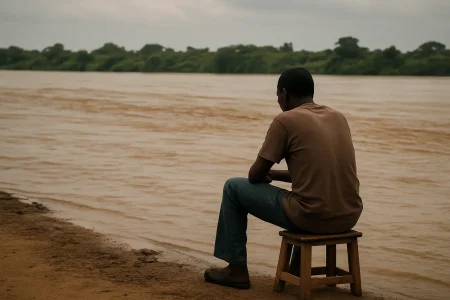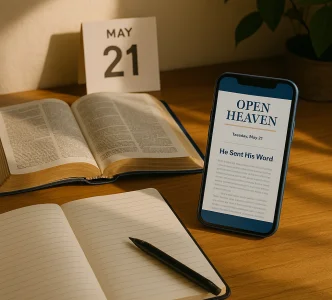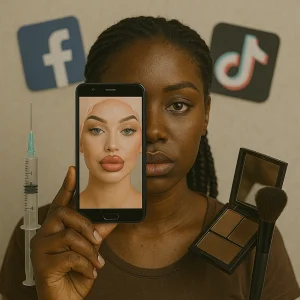
Niger Floods Take Futures: How We Heal Together
In this brief reflection, Nigeria's cycle of disasters, from floods to insecurity, strips hope from the most vulnerable while distance makes it easier for others to look away. True healing requires choosing conscious connection over comfortable indifference, transforming individual grief into collective action, and building systems that protect rather than abandon those who need support most.
There's a particular kind of silence that follows devastating news, the moment when numbers become names, when statistics transform into stories of children who will never return home from school. The floods in Niger State didn't just claim 151 lives; they swept away dreams carefully nurtured in modest homes and futures painstakingly built despite Nigeria's numerous challenges. In a nation where hope often feels like a luxury we can barely afford, natural disasters arrive as cruel reminders that sometimes our pain has no author to blame, no system to reform, no politician to vote out. They are leaving us to grapple with the weight of powerlessness in a country already burdened by man-made sorrows.
The Geography of Grief
When disaster strikes communities far from our daily routes, something troubling happens in our hearts. Distance becomes a shield, allowing us to scroll past tragedy with practised ease. We've developed sophisticated emotional defences,"Thank God it wasn't my area," we whisper, as if geography could protect us from our shared humanity.But grief has no postal code. The mother in Mokwa who lost her child experiences the same shattering that would devastate any parent in Lagos, Abuja, or Port Harcourt. The difference isn't in the pain - it's in how quickly we allow ourselves to forget when the cameras leave and the headlines fade.
This emotional distance isn't cruelty; it's a form of survival. In a country where daily news carries weight that could crush the strongest spirit, we learn to look away. Yet each time we turn our gaze from suffering, we plant seeds of indifference that slowly separate us from our collective healing.
The Burden of Endless Emergencies
Nigeria has become a nation of perpetual crisis. When floods aren't taking futures, it's insecurity. When insecurity takes a break, it's economic hardship. When economic hardship eases slightly, its infrastructure begins to collapse. We exist in a constant state of emergency that has normalised the abnormal and made us experts at surviving rather than thriving.For those who experience loss directly, this cycle creates a particular kind of exhaustion. It's not just grief, it's grief without resolution, trauma without adequate healing time, recovery efforts interrupted by the next emergency. The therapeutic concept of "meaning-making" becomes nearly impossible when suffering feels both random and endless.
The most vulnerable bear the heaviest burden. While the powerful debate policy in air-conditioned rooms, families in flood-prone areas live with the knowledge that next year's rains could wash away whatever they manage to rebuild. This isn't just poverty, it's the systematic stripping of hope from those who need it most.
Healing Beyond Individual Comfort
True healing from collective trauma requires more than personal resilience, it demands community acknowledgement. When we bear witness to others' pain, we transform isolated suffering into shared humanity. This doesn't mean carrying every burden, but rather choosing conscious connection over comfortable distance.Viktor Frankl taught us that meaning can emerge from the most senseless suffering, but only when we refuse to let trauma have the final word. For Nigeria, this means building systems that protect the vulnerable rather than abandoning them to fate. It means choosing active empathy over passive sympathy.
The floods that took futures in Niger State mirror countless other forces stripping hope from Nigerian communities daily. Healing begins when we stop seeing these as isolated tragedies and start recognising them as symptoms of systems that need our collective attention.
Moving Forward Together
What happened in Mokwa wasn't just about water levels, it was about a country's relationship with its most vulnerable citizens. True healing happens when individual grief transforms into collective action, when private prayers become public advocacy, when temporary sympathy evolves into sustained support.We heal by choosing to stay present with difficulty rather than numbing ourselves with distance. We heal by building communities that prepare for disasters rather than simply responding to them. Most importantly, we heal by refusing to accept that some futures matter less than others.
- Continue the conversation: Share your thoughts on community healing and disaster resilience in our Niger State Flood Updates discussion in The Exchange.
- Get the latest updates: Follow our comprehensive coverage of the Niger State flood response in The Digests.
How do we balance protecting our hearts from constant trauma while remaining open to our shared humanity? What systems would better protect Nigeria's most vulnerable communities?
NigerianBulletin.com
Explore. Experience. Exchange



